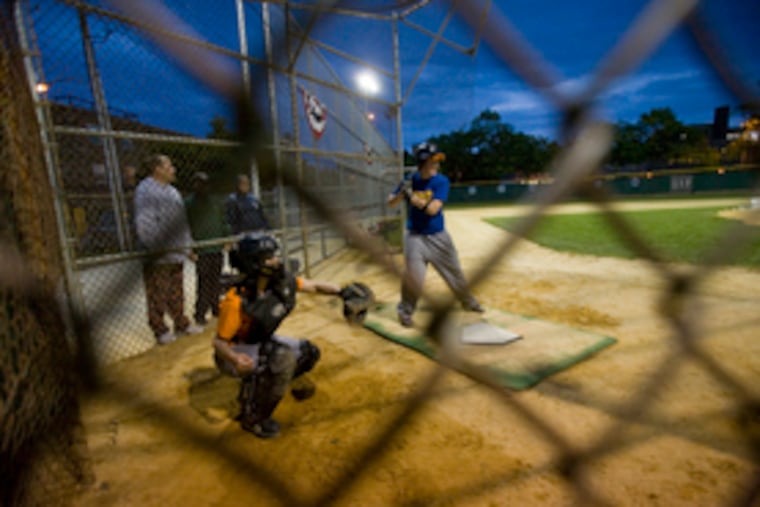Women who love to watch baseball
In 1993, five years into her marriage to a sports superfan, Barbara Carty, a 45-year-old wife and mother from Chester County, watched baseball on television for the first time. She was curious, and the Phillies had made it to the World Series.

In 1993, five years into her marriage to a sports superfan, Barbara Carty, a 45-year-old wife and mother from Chester County, watched baseball on television for the first time. She was curious, and the Phillies had made it to the World Series.
"When Mitch Williams threw that wild pitch in the ninth inning," she said, "I understood for the first time how a true sports fan feels when his team is going to lose; I sobbed."
The Phillies lost the Series and Carty lost her interest in baseball.
Baseball and women are not always a sure thing.
The folks at Gallup News have been crunching fan numbers since the 1930s and their latest results, published in 2002, found that the number of female fans among Americans rose by 10 percentage points (from 27 percent in 1930 to 37 percent in 2002), while the number of male fans decreased to 49 percent (from a high of 53 percent in the 1950s).
The Phillies' Meghan Essman, director of fan development, says the team's fan base is 37 percent female, and the proportion is growing.
The Phils started Baseball 101 for Women, a daylong clinic for fem fans, three years ago. Since then they've added a line of women's shirts and hats and Stitch n'Pitch Night, an evening when needle arts enthusiasts are invited to knit, crochet, embroider or cross-stitch their way through a game with a discounted admission price. This year's Stitch n'Pitch is slated for Aug. 5.
And now come Deidre Silva and Jackie Koney, two Seattle-based writers who, believing even more can be done to attract female fans, have published It Takes More Than Balls, The Savvy Girls' Guide to Understanding Baseball (Skyhorse Publishing Inc., 2008). It's full of anecdotal history and easy-to-understand explanations of rules. But knowing every rule is not necessary, the authors say. And Sandie Hirsch, a Phillies fan from Bucks County, would agree.
"My father always had baseball on the radio. I got interested to please him," said Hirsch. But it was a mild interest.
Years later, after giving birth to a third son, Hirsch said, she realized, "I better stay interested, or I'll be left out."
Now she's 67 and watches most Phillies games at home with her husband. But she sees the games from a broader perspective.
"I experience the game differently. It's like with the computer; I use it at work every day, but don't know what drives it," Hirsch says. "Same thing with baseball; I love to see a triple play, but I don't have to know all the background, like men do, in order to enjoy it."
Silva and Koney also put together a carry-along scorecard book. It's part scrapbook, part journal, and includes questions that address a women's multitasking approach to life while also pulling her into the game: "What are you willing to do to be on the stadium's big screen?; Who will you buy presents for this holiday season?; What is the strangest-sounding name in either lineup?; How have you changed in 10 years?"
Sounds a bit weird, but perhaps perfect for Gail Parker of Mayfair. In order to spend time with her husband during baseball season, the 63-year-old Parker says she has to read a book in the same room where he's watching the game. Last year, when her husband got free tickets to a game, Parker agreed to join him. But he reminded her that it wouldn't be a good idea to bring a book.
At the other end of the fan spectrum is Narda Quigley, 30, who teaches business management at Villanova University and is an outfielder in the Philadelphia Women's Baseball League, an organization she helped found five years ago.
As part of the 12-team American Women's Baseball Federation, the league uses volunteer coaches, playing seven-inning games on various regulation-size fields in the region. Their jerseys were donated by the Phils.
"If I win the lottery," says Quigley, "I'd build us a field."
Two years ago, Quigley attended Phillies Baseball 101 for Women for the first time.
"My dream as a girl was to play Major League Baseball," says Quigley. "And this is the closest I came."
Another superfan is Silvi Specter, 14, of Gladwyne, who opted to have a celebration after her bat mitzvah at Citizens Bank Park.
"There have been lots of bar mitzvahs at the Park," says Kristen Zeller, who coordinates special events for the Phillies. "But only one bat mitzvah."
Specter, whose interest in baseball started as a father-daughter experience, has grown into "the Phillies authority in her school," says her mother, Tracey Specter.
Silvi Specter is in Israel now with her school. "She brought a Phillies cap to give to an Israeli soldier, and she insists we e-mail her the scores of every game," her mother said.